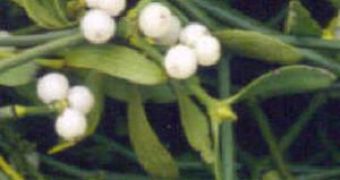Scientists recommend mistletoe as a Christmas decoration and for kissing under and ... just that.
Cause the belief that mistletoe can help treat cancer is a myth which can cause harm.
The warning follows the case of a cancer patient who attended a hospital with a tumor-like growth under the skin induced by mistletoe.
"Some patients with cancer inject themselves mistletoe extract in the hope of improving their condition," explained Professor Edzard Ernst.
In continental Europe, at least 30 different mistletoe preparations are available and in Germany, the insurance system pays for this treatment.
145,000 websites promote or mention mistletoe as a treatment for cancer.
So, is mistletoe an effective anticancer drug and how safe is it?
"The theory that mistletoe might help treat cancer is based on the fact that, like cancer, mistletoe is a parasitic growth that eventually kills its host," says Ernst.
Despite the implausibility of this idea, studies have shown that mistletoe or its main constituents do have anticancer activity.
However, many plants have some sort of anticancer activity, but in most cases, the compounds cannot be used.
Some are sustaining the mistletoe claim that regular injections of mistletoe extract improve the natural course of cancer by slowing down or stopping tumor growth and improve quality of life.
But doctors have noted a wide range of serious adverse reactions, such as anaphylaxis, breathing difficulties, joint pain and kidney failure.
And some researches even suggest that mistletoe extract may enhance the proliferation of some cancers.
"So the claim that mistletoe injections have no serious risks is misleading", argues Ernst.
Even if the mistletoe has been tested extensively as a treatment for cancer, the most reliable trials fail to prove it, and some reports show considerable potential for harm.
Not to mention the high cost of the regular mistletoe injections...

 14 DAY TRIAL //
14 DAY TRIAL //